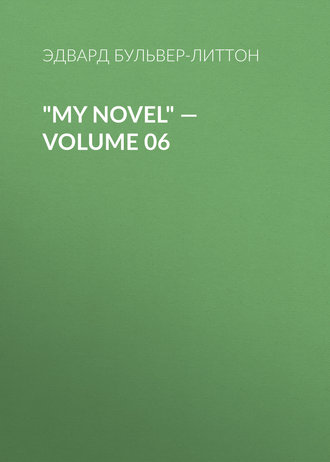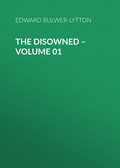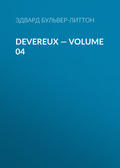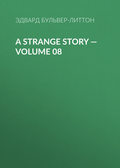
Эдвард Бульвер-Литтон
"My Novel" — Volume 06
CHAPTER XIX
Leonard did not appear at the shop of Mr. Prickett that day. Needless it is to say where he wandered, what he suffered, what thought, what felt. All within was storm. Late at night he returned to his solitary lodging. On his table, neglected since the morning, was Helen's rose-tree. It looked parched and fading. His heart smote him: he watered the poor plant,—perhaps with his tears.
Meanwhile Dr. Morgan, after some debate with himself whether or not to apprise Mrs. Avenel of Leonard's discovery and message, resolved to spare her an uneasiness and alarm that might be dangerous to her health, and unnecessary in itself. He replied shortly, that she need not fear Leonard's coming to her house; that he was disinclined to bind himself an apprentice, but that he was provided for at present; and in a few weeks, when Dr. Morgan heard more of him through the tradesman by whom he was employed, the doctor would write to her from Germany. He then went to Mr. Prickett's, told the willing bookseller to keep the young man for the present,—to be kind to him, watch over his habits and conduct, and report to the doctor in his new home, on the Rhine, what avocation he thought Leonard would be best suited for, and most inclined to adopt. The charitable Welshman divided with the bookseller the salary given to Leonard, and left a quarter of his moiety in advance. It is true that he knew he should be repaid on applying to Mrs. Avenel; but being a man of independent spirit himself, he so sympathized with Leonard's present feelings, that he felt as if he should degrade the boy did he maintain him, even secretly, out of Mrs. Avenel's money,—money intended not to raise, but keep him down in life. At the worst, it was a sum the doctor could afford, and he had brought the boy into the world. Having thus, as he thought, safely provided for his two young charges, Helen and Leonard, the doctor then gave himself up to his final preparations for departure. He left a short note for Leonard with Mr. Prickett, containing some brief advice, some kind cheering; a postscript to the effect that he had not communicated to Mrs. Avenel the information Leonard had acquired, and that it were best to leave her in that ignorance; and six small powders to be dissolved in water, and a teaspoonful every fourth hour,— "Sovereign against rage and sombre thoughts," wrote the doctor.
By the evening of the next day Dr. Morgan, accompanied by his pet patient with the chronic tic, whom he had talked into exile, was on the steamboat on his way to Ostend.
Leonard resumed his life at Mr. Prickett's; but the change in him did not escape the bookseller. All his ingenuous simplicity had deserted him. He was very distant and very taciturn; he seemed to have grown much older. I shall not attempt to analyze metaphysically this change. By the help of such words as Leonard may himself occasionally let fall, the reader will dive into the boy's heart, and see how there the change had worked, and is working still. The happy, dreamy peasant-genius gazing on Glory with inebriate, undazzled eyes is no more. It is a man, suddenly cut off from the old household holy ties,—conscious of great powers, and confronted on all sides by barriers of iron, alone with hard Reality and scornful London; and if he catches a glimpse of the lost Helicon, he sees, where he saw the Muse, a pale melancholy spirit veiling its face in shame,—the ghost of the mournful mother, whose child has no name, not even the humblest, among the family of men.
On the second evening after Dr. Morgan's departure, as Leonard was just about to leave the shop, a customer stepped in with a book in his hand, which he had snatched from the shop-boy, who was removing the volumes for the night from the booth without.
"Mr. Prickett, Mr. Prickett!" said the customer, "I am ashamed of you. You presume to put upon this work, in two volumes, the sum of eight shillings."
Mr. Prickett stepped forth from the Cimmerian gloom of some recess, and cried, "What! Mr. Burley, is that you? But for your voice, I should not have known you."
"Man is like a, book, Mr. Prickett; the commonalty only look to his binding. I am better bound, it is very true." Leonard glanced towards the speaker, who now stood under the gas-lamp, and thought he recognized his face. He looked again. Yes; it was the perch-fisher whom he had met on the banks of the Brent, and who had warned him of the lost fish and the broken line.
MR. BURLEY (continuing).—"But the 'Art of Thinking'!—you charge eight shillings for the 'Art of Thinking.'"
MR. PRICKETT.—"Cheap enough, Mr. Burley. A very clean copy."
MR. BURLEY.—"Usurer! I sold it to you for three shillings. It is more than one hundred and fifty per cent you propose to gain from my 'Art of Thinking.'"
MR. PRICKETT (stuttering and taken aback).—"You sold it to me! Ah, now I remember. But it was more than three shillings I gave. You forget,— two glasses of brandy-and-water."
MR. BURLEY.—"Hospitality, sir, is not to be priced. If you sell your hospitality, you are not worthy to possess my 'Art of Thinking.' I resume it. There are three shillings, and a shilling more for interest. No; on second thoughts, instead of that shilling, I will return your hospitality: and the first time you come my way you shall have two glasses of brandy-and-water."
Mr. Prickett did not look pleased, but he made no objection; and Mr. Burley put the book into his pocket, and turned to examine the shelves. He bought an old jest-book, a stray volume of the Comedies of Destouches, paid for them, put them also into his pocket, and was sauntering out, when he perceived Leonard, who was now standing at the doorway.
"Hem! who is that?" he asked, whispering Mr. Prickett. "A young assistant of mine, and very clever."
Mr. Burley scanned Leonard from top to toe.
"We have met before, sir. But you look as if you had returned to the Brent, and been fishing for my perch."
"Possibly, sir," answered Leonard. "But my line is tough, and is not yet broken, though the fish drags it amongst the weeds, and buries itself in the mud."
He lifted his hat, bowed slightly, and walked on.
"He is clever," said Mr. Burley to the bookseller: "he understands allegory."
MR. PRICKETT.—-"Poor youth! He came to town with the idea of turning author: you know what that is, Mr. Burley."
MR. BURLEY (with an air of superb dignity).—"Bibliopole, yes! An author is a being between gods and men, who ought to be lodged in a palace, and entertained at the public charge upon ortolans and Tokay. He should be kept lapped in down, and curtained with silken awnings from the cares of life, have nothing to do but to write books upon tables of cedar, and fish for perch from a gilded galley. And that 's what will come to pass when the ages lose their barbarism and know their benefactors. Meanwhile, sir, I invite you to my rooms, and will regale you upon brandy-and-water as long as I can pay for it; and when I cannot—you shall regale me."
Mr. Prickett muttered, "A very bad bargain indeed," as Mr. Burley, with his chin in the air, stepped into the street.
CHAPTER XX
At first Leonard had always returned home through the crowded thoroughfares,—the contact of numbers had animated his spirits. But the last two days, since the discovery of his birth, he had taken his way down the comparatively unpeopled path of the New Road.
He had just gained that part of this outskirt in which the statuaries and tomb-makers exhibit their gloomy wares, furniture alike for gardens and for graves,—and, pausing, contemplated a column, on which was placed an urn, half covered with a funeral mantle, when his shoulder was lightly tapped, and, turning quickly, he saw Mr. Burley standing behind him.
"Excuse me, sir, but you understand perch-fishing; and since we find ourselves on the same road, I should like to be better acquainted with you. I hear you once wished to be an author. I am one."
Leonard had never before, to his knowledge, seen an author, and a mournful smile passed his lips as he surveyed the perch-fisher.
Mr. Burley was indeed very differently attired since the first interview by the brooklet. He looked much less like an author,—but more perhaps like a perch-fisher. He had a new white hat, stuck on one side of his head, a new green overcoat, new gray trousers, and new boots. In his hand was a whalebone stick, with a silver handle. Nothing could be more vagrant, devil-me-Garish, and, to use a slang word, tigerish, than his whole air. Yet, vulgar as was his costume, he did not himself seem vulgar, but rather eccentric, lawless,—something out of the pale of convention. His face looked more pale and more puffed than before, the tip of his nose redder; but the spark in his eye was of a livelier light, and there was self-enjoyment in the corners of his sensual, humorous lip.
"You are an author, sir," repeated Leonard. "Well; and what is your report of the calling? Yonder column props an urn. The column is tall, and the urn is graceful. But it looks out of place by the roadside: what say you?"
MR. BURLEY.—"It would look better in the churchyard."
LEONARD.—"So I was thinking. And you are an author!"
MR. BURLEY.—"Ah, I said you had a quick sense of allegory. And so you think an author looks better in a churchyard, when you see him but as a muffled urn under the moonshine, than standing beneath the gas-lamp in a white hat, and with a red tip to his nose. Abstractedly, you are right. But, with your leave, the author would rather be where he is. Let us walk on." The two men felt an interest in each other, and they walked some yards in silence.
"To return to the urn," said Mr. Burley,—"you think of fame and churchyards. Natural enough, before illusion dies; but I think of the moment, of existence,—and I laugh at fame. Fame, sir—not worth a glass of cold-without! And as for a glass of warm, with sugar—and five shillings in one's pocket to spend as one pleases—what is there in Westminster Abbey to compare with it?"
"Talk on, sir,—I should like to hear you talk. Let me listen and hold my tongue." Leonard pulled his hat over his brows, and gave up his moody, questioning, turbulent mind to his new acquaintance.
And John Burley talked on. A dangerous and fascinating talk it was,— the talk of a great intellect fallen; a serpent trailing its length on the ground, and showing bright, shifting, glorious hues, as it grovelled,—a serpent, yet without the serpent's guile. If John Burley deceived and tempted, he meant it not,—he crawled and glittered alike honestly. No dove could be more simple.
Laughing at fame, he yet dwelt with an eloquent enthusiasm on the joy of composition. "What do I care what men without are to say and think of the words that gush forth on my page?" cried he. "If you think of the public, of urns, and laurels, while you write, you are no genius; you are not fit to be an author. I write because it rejoices me, because it is my nature. Written, I care no more what becomes of it than the lark for the effect that the song has on the peasant it wakes to the plough. The poet, like the lark, sings 'from his watch-tower in the skies.' Is this true?"
"Yes, very true!"
"What can rob us of this joy? The bookseller will not buy; the public will not read. Let them sleep at the foot of the ladder of the angels, —we climb it all the same. And then one settles down into such good- tempered Lucianic contempt for men. One wants so little from them, when one knows what one's self is worth, and what they are. They are just worth the coin one can extract from them, in order to live.
"Our life—that is worth so much to us. And then their joys, so vulgar to them, we can make them golden and kingly. Do you suppose Burns drinking at the alehouse, with his boors around him, was drinking, like them, only beer and whiskey? No, he was drinking nectar; he was imbibing his own ambrosial thoughts,—shaking with the laughter of the gods. The coarse human liquid was just needed to unlock his spirit from the clay,— take it from jerkin and corduroys, and wrap it in the 'singing robes' that floated wide in the skies: the beer or the whiskey needed but for that, and then it changed at once into the drink of Hebe. But come, you have not known this life,—you have not seen it. Come, give me this night. I have moneys about me,—I will fling them abroad as liberally as Alexander himself, when he left to his share but hope. Come!"
"Whither?"
"To my throne. On that throne last sat Edmund Kean, mighty mime! I am his successor. We will see whether in truth these wild sons of genius, who are cited but 'to point a moral and adorn a tale,' were objects of compassion. Sober-suited tits to lament over a Savage or a Morland, a Porson and a Burns!"
"Or a Chatterton," said Leonard, gloomily.
"Chatterton was an impostor in all things; he feigned excesses that he never knew. He a bacchanalian, a royster! HE! No. We will talk of him. Come!"
Leonard went.
CHAPTER XXI
The Room! And the smoke-reek, and the gas glare of it! The whitewash of the walls, and the prints thereon of the actors in their mime-robes, and stage postures,—actors as far back as their own lost Augustan era, when the stage was a real living influence on the manners and the age! There was Betterton, in wig and gown,—as Cato, moralizing on the soul's eternity, and halting between Plato and the dagger. There was Woodward as "The Fine Gentleman," with the inimitable rake-hell in which the heroes of Wycherly and Congreve and Farquhar live again. There was jovial Quin as Falstaff, with round buckler and "fair round belly." There was Colley Cibber in brocade, taking snuff as with "his Lord," the thumb and forefinger raised in air, and looking at you for applause. There was Macklin as Shylock, with knife in hand: and Kemble in the solemn weeds of the Dane; and Kean in the place of honour over the chimneypiece.
When we are suddenly taken from practical life, with its real workday men, and presented to the portraits of those sole heroes of a world Fantastic and Phantasmal, in the garments wherein they did "strut and fret their hour upon the stage," verily there is something in the sight that moves an inner sense within ourselves,—for all of us have an inner sense of some existence, apart from the one that wears away our days: an existence that, afar from St. James's and St. Giles's, the Law Courts and Exchange, goes its way in terror or mirth, in smiles or in tears, through a vague magic-land of the poets. There, see those actors—they are the men who lived it—to whom our world was the false one, to whom the Imaginary was the Actual! And did Shakspeare himself, in his life, ever hearken to such applause as thundered round the personators of his airy images? Vague children of the most transient of the arts, fleet shadows on running waters, though thrown down from the steadfast stars, were ye not happier than we who live in the Real? How strange you must feel in the great circuit that ye now take through eternity! No prompt-books, no lamps, no acting Congreve and Shakspeare there! For what parts in the skies have your studies on the earth fitted you? Your ultimate destinies are very puzzling. Hail to your effigies, and pass we on!
There, too, on the whitewashed walls, were admitted the portraits of ruder rivals in the arena of fame,—yet they, too, had known an applause warmer than his age gave to Shakspeare; the Champions of the Ring,—Cribb and Molyneux and Dutch Sam. Interspersed with these was an old print of Newmarket in the early part of the last century, and sundry engravings from Hogarth. But poets, oh, they were there too! poets who might be supposed to have been sufficiently good fellows to be at home with such companions,—Shakspeare, of course, with his placid forehead; Ben Jonson, with his heavy scowl; Burns and Byron cheek by jowl. But the strangest of all these heterogeneous specimens of graphic art was a full-length print of William Pitt!—-William Pitt, the austere and imperious. What the deuce did he do there amongst prize-fighters and actors and poets? It seemed an insult to his grand memory. Nevertheless there he was, very erect, and with a look of ineffable disgust in his upturned nostrils. The portraits on the sordid walls were very like the crambo in the minds of ordinary men,—very like the motley pictures of the FAMOUS hung up in your parlour, O my Public! Actors and prize-fighters, poets and statesmen, all without congruity and fitness, all whom you have been to see or to hear for a moment, and whose names have stared out in your newspapers, O my public!
And the company? Indescribable! Comedians, from small theatres, out of employ; pale, haggard-looking boys, probably the sons of worthy traders, trying their best to break their fathers' hearts; here and there the marked features of a Jew. Now and then you might see the curious puzzled face of some greenhorn about town, or perhaps a Cantab; and men of grave age, and grayhaired, were there, and amongst them a wondrous proportion of carbuncled faces and bottle-noses. And when John Burley entered, there was a shout that made William Pitt shake in his frame. Such stamping and hallooing, and such hurrahs for "Burley John." And the gentleman who had filled the great high leathern chair in his absence gave it up to John Burley; and Leonard, with his grave, observant eye, and lip half sad and half scornful, placed himself by the side of his introducer. There was a nameless, expectant stir through the assembly, as there is in the pit of the opera when some great singer advances to the lamps, and begins, "Di tanti palpiti." Time flies. Look at the Dutch clock over the door. Half-an-hour. John Burley begins to warm. A yet quicker light begins to break from his Eye; his voice has a mellow luscious roll in it.
"He will be grand to-night," whispered a thin man, who looked like a tailor, seated on the other side of Leonard. Time flies,—an hour. Look again at the Dutch clock. John Burley is grand, he is in his zenith, at his culminating point. What magnificent drollery! what luxuriant humour! How the Rabelais shakes in his easy-chair! Under the rush and the roar of this fun (what word else shall describe it?) the man's intellect is as clear as gold sand under a river. Such wit and such truth, and, at times, such a flood of quick eloquence! All now are listeners,—silent, save in applause.
And Leonard listened too. Not, as he would some nights ago, in innocent unquestioning delight. No; his mind has passed through great sorrow, great passion, and it comes out unsettled, inquiring, eager, brooding over joy itself as over a problem. And the drink circulates, and faces change; and there are gabbling and babbling; and Burley's head sinks in his bosom, and he is silent. And up starts a wild, dissolute, bacchanalian glee for seven voices. And the smoke-reek grows denser and thicker, and the gaslight looks dizzy through the haze. And John Burley's eyes reel.
Look again at the Dutch clock. Two hours have gone. John Burley has broken out again from his silence, his voice thick and husky, and his laugh cracked; and he talks, O ye gods! such rubbish and ribaldry; and the listeners roar aloud, and think it finer than before. And Leonard, who had hitherto been measuring himself in his mind against the giant, and saying inly, "He soars out of my reach," finds the giant shrink smaller and smaller, and saith to himself, "He is but of man's common standard after all!"
Look again at the Dutch clock. Three hours have passed. Is John Burley now of man's common standard? Man himself seems to have vanished from the scene,—his soul stolen from him, his form gone away with the fumes of the smoke, and the nauseous steam from that fiery bowl. And Leonard looked round, and saw but the swine of Circe,—some on the floor, some staggering against the walls, some hugging each other on the tables, some fighting, some bawling, some weeping. The divine spark had fled from the human face; the Beast is everywhere growing more and snore out of the thing that had been Man. And John Burley, still unconquered, but clean lost to his senses, fancies himself a preacher, and drawls forth the most lugubrious sermon upon the brevity of life that mortal ever beard, accompanied with unctuous sobs; and now and then in the midst of balderdash gleams out a gorgeous sentence, that Jeremy Taylor might have envied, drivelling away again into a cadence below the rhetoric of a Muggletonian. And the waiters choked up the doorway, listening and laughing, and prepared to call cabs and coaches; and suddenly some one turned off the gaslight, and all was dark as pitch,—howls and laughter, as of the damned, ringing through the Pandemonium. Out from the black atmosphere stepped the boy-poet; and the still stars rushed on his sight, as they looked over the grimy roof-tops.







